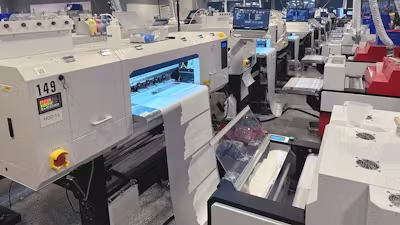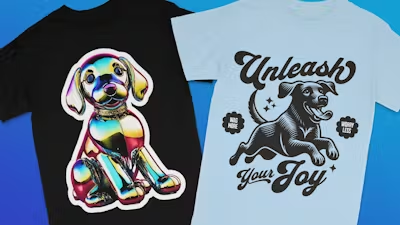In the ever-evolving realm of custom printing, DTF transfers are a game-changing innovation. But what are they, and why should they matter to you?
DTF transfers have quickly gained traction among printers, brands, and creative individuals seeking a unique touch for their products. Coming in hot with advanced technology and superior quality, DTF transfers offer fresh possibilities to personalize items like never before.
Have you ever asked yourself the question 'what is a DTF transfer?' Then make sure to read on.
In this article, we take the mystery out of DTF transfers, explain how they work, and highlight their advantages compared to other methods. We'll also guide you on using these transfers to create customized items. Let's begin.
Table Of Contents
- What is a DTF transfer?
- Components of a DTF transfer
- How a DTF transfer works
- Benefits of DTF transfers
- Comparison to other print methods
- Unique advantages of DTF transfers
- How to use DTF transfers at home or office
- Tools and equipment needed
- Ordering DTF transfers
- Applying DTF transfers
- Popular products for using DTF transfers
- Apparel
- Accessories and promotional products
- Conclusion
- FAQs

What is a DTF Transfer?
A DTF (Direct-To-Film) transfer is a form of heat transfer where an image is printed on a special PET film using innovative DTF printing techniques. It represents a significant leap forward in the heat transfer printing industry, offering unparalleled quality and versatility.
Components of a DTF Transfer
A direct-to-film transfer is not just a piece of film; it's a sophisticated, custom-printed product made up of three essential components:
- PET film: The PET film acts as the 'carrier' of the printed image. It's not just any film but a specialized surface that can hold the high-quality ink and adhesive necessary for the DTF process.
- Ink: The image on a DTF transfer is created using specially formulated DTF inks. These inks offer exceptional vibrancy and flexibility, contributing to the final high-quality, durable print.
- Hot melt powder: Applied to the printed ink on the PET film, the hot melt powder is the "glue" that ensures the printed image securely adheres to the substrate during heat pressing.

How a DTF transfer works
Once the image is printed onto the PET film and the adhesive is applied and cured, the DTF transfer is prepared for its final destination. A heat press activates the adhesive, allowing the image to bond securely with the substrate. Once the heat press is lifted, the film is cooled and peeled away, you're left with a vibrant, full-color image perfectly transferred onto your item.
Benefits of DTF transfers
DTF transfers might be the latest addition to the heat transfer family, but they've quickly secured their place near the top thanks to various unique advantages.
Comparison to other print methods
DTF transfers offer superior quality and versatility compared to traditional heat transfer methods. While heat transfer paper, sublimation, and vinyl have their place, they often fall short in color vibrancy, durability, and application on diverse materials. Conversely, DTF transfers are known for their exceptional vibrancy, durability, and application on different materials, from cotton and polyester to leather and hard items.
To understand how DTF transfers stack up to other popular print methods, explore our comparisons of DTF vs. Screen Printing and DTF vs. DTG.

Unique advantages of DTF transfers
The true power of DTF transfers lies in their unique advantages:
- Vibrant, full-color images: You're not limited to a few colors with DTF transfers. They can reproduce complex, multi-colored designs with impressive detail and vibrancy.
- High durability: DTF transfers are incredibly flexible, highly durable, and can withstand numerous washes without fading or cracking, making them an excellent choice for frequently used items.
- Versatility: Unlike other methods that are restricted to certain materials, DTF transfers can be applied to various substrates, broadening the horizon for your creativity.
- Ease of use: Applying a DTF transfer is a straightforward process. With a heat press, Cricut, or even a household iron, you can easily transfer intricate designs onto your products.
- Cost-effective for small runs: For small batch printing or one-off designs, DTF transfers are an economical choice as they don't require the same level of setup as other printing methods.
How to use DTF transfers at home or office
Direct-To-Film transfers offer immense creative freedom with very little setup. Here's how to use DTF transfers at home or office and become a transfer ninja in no time.
Tools and equipment needed
You don't need a full-fledged printing setup or specialized equipment to apply a DTF transfer. Your main tool is a heat source that can apply uniform heat and pressure. A heat press is best, but a Cricut EasyPress, or even a regular household iron will work. Other than that, all you need is a clean, flat surface for application and your chosen items to customize to start a creative endeavor with DTF transfers.

If you're ready to invest in reliable equipment, learn about how to pick the right one.
Ordering DTF transfers
Unless you are a professional printer expanding into the field of DTF, you’ll be ordering pre-printed transfers from a company like ours. Simply upload your design, specify your transfer size, and place your order. We take care of the DTF printing and ship your ready-to-press transfers right to your doorstep.
Order a free sample pack to try at home and see what all the excitement is about.
Applying DTF transfers
Once the DTF transfers arrive, it's time to bring your creations to life. While there may be some variation in instructions for different materials, the general application process is as follows:
- Prepare the substrate: Ensure that the item you're transferring the design onto is clean and free of wrinkles. Giving the material a quick press can ensure a smooth surface.
- Position the transfer: Carefully place the DTF transfer onto your item, ensuring it's aligned and straight. A placement tool set can help ensure consistent print locations.
- Apply heat: Use your heat press, Cricut EasyPress, or home iron, following the provided temperature and timing instructions to apply the transfer onto the item.
- Peel away: After pressing, gently peel off the PET film, unveiling your beautiful, high-quality print.

Using DTF transfers is not a skill exclusive to professional print shops or large businesses. Anyone can create stunning, professional-quality custom items with just a few tools and a dash of practice. For a more detailed step-by-step guide, you can check out our tutorial on how to apply DTF transfers.
Popular products for using DTF transfers
DTF transfers are flexible and can be used to customize a wide variety of items including apparel, accessories, and promotional products. Please note, items with curved surfaces may require specialized heat press equipment for successful DTF transfer application.
Apparel
DTF transfers can turn any piece of clothing into a unique statement. They are especially ideal for unusual placements and normally hard-to-print items. Here are some examples:
- T-Shirts and tank tops: Ideal for casual wear, event merchandise, or corporate branding.
- Hoodies and sweatshirts: Perfect for distinctive branded merchandise during colder seasons.
- Athletic wear: DTF transfers adhere to various fabrics, from team uniforms to workout gear.
- Children's clothing: Create unique designs for kids' apparel, from shirts to baby onesies.
Accessories and promotional products
DTF transfers are also suitable for accessories and promo items. The same transfers can be used across multiple products, ensuring brand consistency.
- Caps and hats: Customize a wide range of headgear, from baseball caps to beanies.
- Bags: Make a statement with custom designs on tote bags, drawstring bags, and canvas pouches.
- Promotional products: Transform ordinary items like mugs, mouse pads, and water bottles.
New! Recently, Ninja Transfers have stepped up our game further by offering a new product: UV DTF Stickers. These stickers are permanent and require no heat for application, so you can easily customize almost any hard item with a bold and durable decoration.

Conclusion
In the dynamic world of custom printing, DTF transfers are a standout with their unrivaled quality and versatility. They are the embodiment of customization, liberating users from the limitations of conventional printing techniques. No matter if you're a home crafter, a small business, or a commercial enterprise, DTF transfers open a world of distinctive opportunities. After reading this article, you should know the answer to the question 'What is a DTF transfer?'.
While mastering the DTF application requires some understanding and experience, the payoff in quality, durability, and flexibility is immense. At Ninja Transfers, we're more than just a DTF supplier; we're a partner in your creative endeavor, providing custom printed transfers, supplies, and unwavering support, empowering you to unleash your inner ninja.

FAQs
Some common questions we've encountered from our clients and those interested in DTF transfers:
What does DTF mean in printing?
In the context of transfers, DTF stands for Direct-To-Film: a printing technique where designs are printed onto a special film before being transferred onto a variety of substrates using heat. However, it's worth noting that in the broader printing industry, DTF can also mean Direct-To-Fabric, which involves printing directly onto large fabric rolls before they're cut and assembled.
How long do DTF transfers last?
With proper care, DTF prints can be incredibly durable, lasting as long as the product they're applied to. Care generally involves washing at cooler temperatures and avoiding aggressive tumble drying or dry cleaning. However, it's crucial to note that proper application is the foundation of a long-lasting DTF print. An incorrectly applied transfer may not achieve the same level of durability.
How much do DTF transfers cost?
Contrary to common assumptions, the cost of DTF transfers doesn't depend on the complexity of the design or the number of colors used. Instead, the pricing is more often influenced by the design size and the order quantity. At Ninja Transfers, we aim to offer competitive pricing. DTF transfers can be more affordable than other printing methods in certain scenarios, particularly for larger orders.







































